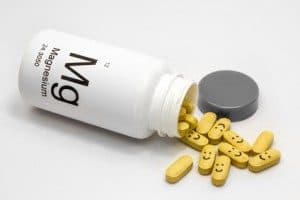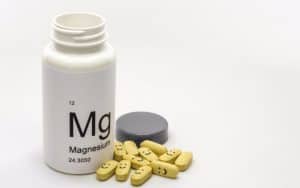10 Health Benefits of Consuming Magnesium
Disclosure: We use affiliate links and may receive a small commission on purchases.
 10 Health Benefits of Consuming Magnesium
thefitbay.com
10 Health Benefits of Consuming Magnesium
thefitbay.com
Magnesium is an electrolyte that is crucial to the body’s function. In fact, it’s the fourth most abundant mineral in the human body. Magnesium helps regulate blood pressure, strengthen bones, and steady the heart’s rhythm. Other functions that require magnesium include protein synthesis, nerve function, blood sugar control, neurotransmitter release, energy metabolism, and production of the antioxidant gluthathione. Like many minerals that naturally occur in the human body, many people in the U.S. aren’t eating enough foods with magnesium.
Adults who don’t consume the recommended amount of magnesium are more likely to have elevated inflammation markers. Inflammation has been associated with major health conditions like heart disease, diabetes, and certain cancers. Low magnesium also appears to be a risk factor for osteoporosis.
Health Benefits of Magnesium
Magnesium is a vital nutrient that keeps your body’s systems running smoothly. It has many health benefits; here are ten of them, listed in no particular order.
Helps increase energy.

Magnesium creates energy in the body by activating adenosine triphosphate, also known as ATP. Without consuming enough magnesium, you don’t have the energy you need and can suffer from fatigue more easily. Inadequate magnesium intake also means you tire more quickly and need more oxygen when you exercise. One study found that magnesium-deficient women who exercised needed more oxygen and had a higher heart rate than when they performed the same exercise with higher magnesium levels.
Calms nerves and anxiety.
Magnesium helps with the function of GABA, an inhibitory neurotransmitter that produces “happy hormones” like serotonin. Certain hormones regulated by magnesium are essential to calm the brain and promote relaxation. That’s why a magnesium deficiency can lead to sleeplessness or insomnia. Magnesium deficiency has been shown to cause an increase in the production of stress hormones in mice.
Treats insomnia and helps you fall asleep.
Magnesium supplements can help calm racing thoughts and make getting a good night’s sleep a whole lot easier. As adults age, their decreased consumption of nutrients and lower absorption rate of nutrients puts many at risk for insomnia.
Helps with digestion by relieving constipation.

Magnesium helps relax muscles in the digestive tract, including the intestinal wall, which controls your ability to go to the bathroom. Because magnesium helps neutralize stomach acid and moves stool through the intestines, it acts as a natural laxative.
Relieves muscle aches and spasms.
Magnesium helps regulate neuromuscular signals and muscle contractions. When you’re magnesium-deficient, your muscles can actually spasm. Magnesium helps muscles relax, contract, and makes it easier to move around. Magnesium also balances calcium within the body, which is good because overly high doses of calcium (usually from supplements) can cause problems associated with muscle control–including control of the heart.
Regulates calcium, sodium, and potassium levels.
Along with other electrolytes, magnesium regulates a variety of biochemical reactions in the body. It helps actively transport calcium and potassium ions across cell membranes, which makes magnesium vital to nerve impulse conduction, muscle contractions, and normal heart rhythms. Magnesium, in combination with calcium, also contributes to the structural development of bone and is needed to synthesize DNA, RNA, and the antioxidant glutathione.
Helps prevent osteoporosis.

Magnesium is required to properly form bones, and it influences the activities of osteoblasts and osteoclasts, which build healthy bone density. It also plays a role in balancing blood concentrations of vitamin D, which is a major regulator of bone homeostasis. Studies have shown that higher magnesium intake correlates with increased bone mineral density in both men and women. Women can help prevent or reverse osteoporosis by increasing their magnesium consumption.
Prevents migraine headaches.
Because magnesium supports neurotransmitter function and blood circulation, it can help control migraine headache pain by releasing pain-alleviating hormones and reducing vasoconstriction, or the constriction of the blood vessels that raise blood pressure (which causes migraines in the first place). Research has shown that when sufferers of migraines take magnesium supplements, their symptoms improve.
Treats hypertension (high blood pressure).
High magnesium intake can reduce the risk of developing hypertension. A lower risk of hypertension has been associated with diets with increased magnesium and dietary fiber.
Boosts exercise performance.

Magnesium supplements have been shown to enhance exercise performance in several studies. During exercise, you may need 10-20% more magnesium than when you’re resting, depending on the activity. Magnesium helps move blood sugar into your muscles and dispose of lactic acid, which builds up in muscles during exercise and causes cramps and soreness. Studies have shown that magnesium can boost exercise performance for athletes, the elderly, and people with chronic disease.
How To Tell If You’re Magnesium Deficient
Less than 30% of U.S. adults consume the Recommended Daily Allowance (RDA) of magnesium, while nearly 20% get only half of the magnesium they need daily to remain healthy. Symptoms of poor magnesium intake can include muscle cramps, facial tics, poor sleep, and chronic pain.

But how do you know when you’re not consuming enough magnesium? The most straightforward method is to request detailed magnesium testing from your doctor. However, this test is usually done using blood serum testing, which can be ineffective or misleading. That’s because only 1% of magnesium in the body is actually found in the blood (only 0.3% in blood serum), so clinical blood serum testing may not be the most accurate test of magnesium deficiency. Magnesium is typically found in the bone marrow, muscles, heart, and liver.
But don’t worry, you can estimate your magnesium levels by simply answering a few questions about your lifestyle, and monitoring certain signs of low magnesium levels.
The signs include:
- Drinking carbonated beverages
- Most dark-colored sodas contain phosphates, which actually bind with magnesium inside the digestive tract and render it unavailable to the body. So even if you’re consuming enough magnesium, drinking soda can actually flush it out of your system. All that hard work for nothing! Eliminating sodas altogether or reducing the amount you drink can greatly improve your health in many ways, including raising your magnesium levels in the long run.
- Eating sugary foods regularly
- Refined sugar has no nutritional benefits and definitely no magnesium (unlike molasses, which is the purer form of sugar and contains magnesium). Even worse, sugar also causes the body to excrete magnesium through the kidneys. Sweet foods are even known by nutritionists as “anti-nutrients,” because they replace whole nutritious foods in the diet while actually consuming nutrients when digested. Sugar therefore results in a net loss of nutrients in the body, because all foods require vitamins and minerals to be digested. Instead of refined sugar, include foods that replenish the vital nutrients in your body.
- High stress levels and/or a recent surgery
- Stress can cause magnesium deficiency, and a lack of magnesium tends to magnify the stress reaction. It’s a vicious cycle. Stressful conditions use up more magnesium in the body, which means that both psychological and physical forms of stress such as surgery, burns, and chronic disease can lead to a magnesium deficiency.
- Caffeine consumption
- The kidneys, which filter and excrete excess minerals, largely control the body’s magnesium levels. Unfortunately for those of us who love drinking coffee, tea, and soda (see above), caffeine causes the kidneys to release extra magnesium regardless of the body’s actual magnesium levels. Regular consumption of caffeinated beverages increases the risk of magnesium deficiency.
- Certain medications
- The effects of certain drugs can reduce magnesium levels by increasing magnesium loss through excretion by the kidneys (the same process that happens thanks to caffeine consumption). If you take a diuretic, heart medication, asthma medication, birth control pills, or estrogen replacement therapy, your body may be getting rid of too much magnesium and you could be deficient.
- Drinking more than 7 alcoholic beverages per week
- Alcohol, like caffeine or diuretics, also lowers magnesium available to the cells by increasing the excretion of magnesium by the kidneys. Researchers have found clinical magnesium deficiency in 30% of alcoholics.
Recommended Daily Allowance for Magnesium
According to the National Institutes of Health, these are the current RDAs for magnesium depending on your age and gender:
- Infants–6 months: 30 mg
- 7–12 months: 75 mg
- 1–3 years: 80 mg
- 4–8 years: 130 mg
- 9–13 years: 240 mg
- 14–18 years: 410 for men; 360 mg for women
- 19–30 years: 400 mg for men; 310 mg for women
- Adults 31 years and older: 420 mg for men; 320 mg for women
- Pregnant women: 350-360 mg
- Women who are breastfeeding: 310-320 mg
Possible Side Effects

Like all supplements, you should never take magnesium without knowing the contraindications, or conditions that could make the supplement unsafe to take. Never take more than the recommended dosage of magnesium. Consult your doctor if you’re not sure whether consuming magnesium would be right for you.
Magnesium is likely safe for most people when taken by mouth appropriately or when the prescription-only, injectable product is used correctly. Magnesium might cause side effects in some people, including stomach upset, nausea, vomiting, and diarrhea.
Doses less than 350 mg daily are safe for most adults. When taken in very large amounts, magnesium is possibly unsafe. Large doses might cause too much magnesium to build up in the body, causing serious side effects–an irregular heartbeat, low blood pressure, confusion, slowed breathing, coma, and even death.
Magnesium is likely safe for pregnant or breast-feeding women when taken in doses less than 350 mg daily. Magnesium is possibly safe when injected as a shot or intravenously (by IV) before delivery. Magnesium is possibly unsafe when taken by mouth or by IV in high doses.
Magnesium is likely safe for children when taken by mouth appropriately or when the prescription-only, injectable product is used correctly. See the above information to determine what dosage of magnesium your child needs based on their age. Magnesium is likely unsafe when taken in higher doses than recommended by a doctor.
Interactions with Other Supplements
Some drugs interact negatively with magnesium supplements. These include antibiotics (Aminoglycoside, Quinolone, and Tetracycline), bisphosphonates, high blood pressure medications (calcium channel blockers), muscle relaxants, and water pills (potassium-sparing diuretics). Be mindful of any other drugs or supplements you may be taking along with magnesium to minimize side effects or bad reactions.
For more information about magnesium supplements, browse through our list for best magnesium supplements available on the market today!










